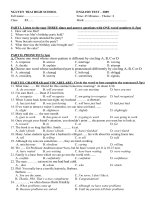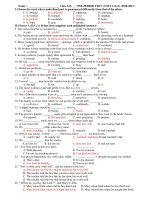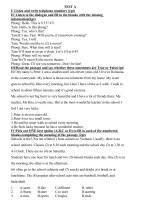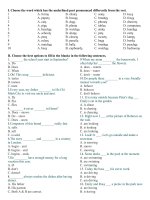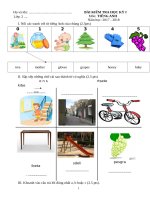TEST unit 1, 2, 3 g11
Bạn đang xem bản rút gọn của tài liệu. Xem và tải ngay bản đầy đủ của tài liệu tại đây (96.62 KB, 11 trang )
TEST 1 – Unit 1, 2, 3
(15 minutes)
I. Choose the best option in the bracket to complete the sentences.
1. When we were at school, we (ought to/ had to/ must) wear uniform.
2. You (don't have to/ mustn’t/ ought not to) be an expert to use the basic functions of
program.
3. You (should/ must/ 've got) to tell her that you are her mother.
4. We (were supposed to/ had got to/ must) go to the meeting. Why didn't you go?
5. I (mustn’t/ don’t have to/ shouldn't) wear glasses. I still can see perfectly well.
6. We went to bed right after dinner because we (had to/ must/ should) get up early the
following day.
7. Do you (have to/ must/ mustn't) work next weekend?
8. You (hadn’t to/ didn’t have to/ shouldn't) take any money. I have enough for both of
us.
9. What are you doing? You (don’t have to/ aren’t supposed to/ ought not) be here!
10. We (shouldn't/ weren't allowed to/ mustn't) talk to each other because it was an
exam.
II. Choose the underlined part that needs correction in each of the following
questions.
11. (A) I will leave here early (B) because (C) I must (D) studying for my exam.
12. I (A) stayed up (B) late last night because I (C) mustn't go to school (D) on Sunday.
13. We (A) ought to not play football (B) as (C) it's raining (D) outside.
14. You (A) mustn't (B) to drive a car (C) if you (D) don't have a driving licence.
15. If you (A) want some useful (B) advice, you (C) have better talk to your parents (D)
about your problem.
16. Yesterday I (A) must (B) stay (C) at home (D) due to the bad storm.
17. Because of his (A) poverty, he (B) has to (C) struggling to (D) make ends meet.
18. (A) According to the rules (B) of this game, you (C) don't have to (D) drop the ball.
19. This competition is (A) optional, so we (B) not (C) have to take part in (D) it.
20. My (A) advice is you (B) have to consider carefully (C) before (D) making the final
decision.
TEST 2 – Unit 1, 2, 3
(15 minutes)
I. Choose the best answer in brackets complete the sentences.
1. What's wrong with you? You look (unhappy/unhappily) today.
2. He (sudden/ suddenly) appeared in the meeting.
3. I taste the soup very (careful/carefully). Don't worry!
4. My wife appeared (calm/ calmly) after the news.
5. He is shouting at his son. He seems very (angry/angrily).
6. I think the food smells (terrible/terribly). You should throw it away.
7. This plant grows (quickly/quick) if it absorbs enough water.
8. His resignation was very (surprising/ surprisingly).
9. The doctor checked my legs (carefuIly / careful) to see if there were any injuries.
10. She is looking at the picture (attentive/attentively).
II. Choose the underlined part that needs correction in each of the following
questions.
11. (A) That (B) was Tim (C) who (D) went to hospital last week.
1
12. It was (A) in Ha Noi (B) that I first (C) meet (D) my wife.
13. It (A) is (B) in 2010 (C) that I (D) graduated from university.
14. It (A) was (B) on New Year's Eve (C) who my sister (D) broke up with her boyfriend.
15. It (A) was her husband (B) who (C) dropped out of his university and (D) setted up
his business.
16. I (A) feel both (B) excited and (C) nervously because I have got a (D) date with
Daisy tomorrow.
17. The (A) humid weather (B) made it (C) difficultly to enjoy the (D) tropical beach.
18. It was in a (A) warm and cosy coffee shop (B) in where they (C) had their (D) first
date.
19. Tom’s parents (A) are not pleased because he (B) does not study (C) hardly and (D)
seriously enough.
20. The food was (A) good with (B) reasonable price, (C) but the service was (D) slowly.
TEST 3 – Unit 1, 2, 3
(15 minutes)
I. Complete the letter by choosing the best answer in brackets.
Dear Daisy,
My parents and I are (1) (glad, disappointed, sad) to know that you passed the final
exam with flying colors. Congratulations! I think that with your excellence, your (2)
(decisive, dream, advice) to become a good doctor will come true.
My younger sister was really (3) (surprised, ability, determined) to receive a hair
curling machine from you on her birthday and she asked me to say "thank you" to you.
However, she doesn’t know the (4) (chance, way, permission) to use that machine. It
seems (5) (difficult, chance, easy) for her to use it.
I am excited that you're going to visit my beautiful city. I want to show you my (6)
(willing, willingness, demand) to take you to famous places.
We’re looking forward to seeing you. It will be (7) (nice, unreasonable, necessity) for
me to welcome you to my house.
Write me soon and confirm your arrival date and time.
Love,
Lisa
II. Rewrite the following sentences using "noun/ adj + to V" and the given
words in brackets.
8. I was very happy that I met my old friends again. (happy)
→ _____________________________________________________________________________
9. He is determined that he can find the best solution to this problem. (determined)
→ _____________________________________________________________________________
10. The room needs cleaning by Ms. Brown this afternoon. (necessary)
→ _____________________________________________________________________________
III. Rewrite the following sentences using "noun + to V" and the given words in
brackets.
11. Nobody knew that she had always wanted to become a teacher. (dream)
→ _____________________________________________________________________________
12. She has a lot of friends because she's willing to help others unconditionally. (because
of, willingness)
→ _____________________________________________________________________________
2
TEST 4 – Unit 1, 2, 3
(45 minutes)
Part 1: Listening
Listen and choose the correct answer.
1. Where did Enrico’s family move to?
A. The south of Italy
B. The USA
C. A small town in Italy
D. The north of Italy
2. How does Carolina describe Enrico when he was young?
A. Quiet and funny
B. Intelligent
C. Quite funny
D. Gorgeous
3. What did she study at university?
A. Law
B. Economics
C. European languages
D. European history
4. What did they arrange to do?
A. Go to a disco
B. Go out for a pizza
C. Go to have a beer
D. Go to see a movie
5. What did they actually do?
A. They went to the cinema
B. They talked in a bar
C. They went to a park
D. They walked on the beach
6. How old is their daughter?
A. 6 months
B. 3 months
C. 1 year
D. 6 years
Part 2: Pronunciation
Choose the letter A, B, C or D to indicate the word whose underlined part
differs from the other three in pronunciation in each of the following
questions.
1. A. afford
B. assistant
C. attractive
D. compassion
2. A. argument
B. mature
C. attitude
D. music
3. A. reconciled B. initiative
C. strict
D. spit
Choose the letter A, B, C or D to indicate the word that differs from the other
three in the position of primary stress in each of the following questions.
4. A. counselor
B. privacy
C. elegant
D. romantic
5. A. sympathetic B. relationship
C. conservative
D. respectable
Part 3: Vocabulary and grammar
Choose the letter A, B, C or D to indicate the correct answer to each of the
following questions.
1. She could ________ in the garage when we arrived. That might be why she didn’t hear
the bell.
A. work
B. be worked
C. have been working
D. be working
2. I will be punished by my parents if I get home after the ________.
A. conflict
B. curfew
C. homestay
D. viewpoint
3. I ________ clean the floor and wash up. That’s the rule in my family.
A. ought to
B. must
C. have to
D. should
4. My best friend ________ my trust.
A. betrayed
B. believed
C. judged
D. opposed
5. There are some apples in the fridge, so you ________ buy them.
3
A. have to
B. mustn't
C. should
D. don't have to
6. My mother is always willing to lend ________ to me when I have problems in life.
A. an eye
B. an ear
C. a nose
D. a face
7. It was in 2010 ________ I graduated from university.
A. whom
B. who
C. that
D. which
8. What’s the matter with you? You look ________.
A. happily
B. sadly
C. unhappy
D. unhappily
9. The young girl sings ________.
A. amazing good
B. amazing well
C. amazingly good
D. amazingly well
10. It was in Ha Noi that I first ________ him.
A. meet
B. met
C. have met
D. had met
Part 4: Reading
Choose the letter A, B, C, or D to indicate the correct word or phrase that best
fits each of the numbered blanks.
Online dating is a good way for (1) _______ shy people to make contact. Once you get
comfortable with a stranger on a virtual basis, you may be encouraged to meet them in
person. If you are on the right dating site, you are more likely to find people looking for
the same things as you and it increases your chances of stumbling (2) _______ the right
partner. Internet dating is an effective way of helping you meet new people and have a
chance to decide (3) _______ you want to have a date in person.
(4) _______ internet dating is very convenient, it can also be misleading. When you
are not personally meeting a person, the risk of being (5) _______ is higher as people
often augment their profile just to attract your attention. If you are not careful, you may
end up wasting many hours of your time with no real results.
1. A. social
B. sociable
C. socially
D. society
2. A. on
B. with
C. for
D. of
3 A. what
B. how
C. whether
D. who
4. A. However
B. When
C. Because
D. While
5. A. robbed
B. deceived
C. exposed
D. defeated
Read the passage below and choose the letter A, B, C, or D to indicate the
correct answer to each question.
What’s the problem with British teenagers? Many British newspapers and TV
programmes are asking this question at the moment. A lot of people are saying that
there are problems with teenagers at school, on the streets and in their homes. Why?
What, or who, is responsible for these problems? A recent BBC television series
explores these questions. It's called 'The world's strictest parents'. Is that because
British parents are very strict? Just the opposite, it seems. The director of the
programme, Andrea Wiseman, explains why they are making it. She thinks that in the
United Kingdom teenagers pay no attention to adults. They don't want to do well at
school. They think they can do what they like and they are only interested in new
fashions and Hollywood celebrities. Why are British teenagers like this? Wiseman says
it's because their parents give their children everything they can. But they give their
children no limits, no rules, no discipline because they want their children to be 'free'.
They don't tell their children to work hard because they don't want their kids to have any
stress. The problem with this is that parents give their sons and daughters no cultural
4
values. When a teenager does something bad and their parents say something, the
teenagers immediately say: 'My parents are really strict’ or 'My parents aren't fair'. So
what happens in the TV programme? Some problematic British teenagers go and live
with parents in different parts of the world. They live with families that believe in
traditional discipline and cultural values. In Ghana, Jamaica, Botswana and the Southern
US state of Alabama, the teenagers have the experience of living with parents who want
and expect good behaviour and hard work. The results are interesting. In the end, the
British teenagers seem to prefer having strict parents!
6. Which of the following is not TRUE about British teenagers according to Wiseman?
A. They think that they have freedom to do anything they like.
B. They show their interest in new fashions.
C. They pay much attention to their parents.
D. They don't want to do well at school.
7. The word “explores” in the passage is closest in meaning to _______.
A. invents
B. investigates
C. looks
D. gives
8. In Wiseman's opinion, British parents _______.
A. are very strict
B. always ask their children to work hard
C. try to teach their children cultural values
D. don't give their kids discipline and rules
9. Which of the following is TRUE according to the passage?
A. An experiment on TV shows that British teenagers seem to dislike having strict
parents.
B. Andrea Wiseman is one of the British teenagers participating in the program called
'The world's strictest parents'.
C. It seems that British parents don't like being strict because they want their sons
and daughters to have freedom.
D. British teenagers think that their parents are very strict, so they always try to do
everything as well as possible.
10. The word “celebrities” in the passage is closest in meaning to _______.
A. famous people
B. talented people
C. rich people
D. good people
Part 5: Writing
Rewrite the following sentences using the words in brackets.
1. Tim doesn’t get permission to use that computer, (mustn't)
→ Tim _________________________________________________________________________
2. If I were you, I would spend more time doing exercise, (should)
→ You _________________________________________________________________________
3. met my old friend, Tom on Monday, (that)
→ It was on _____________________________________________________________________
4. He ended a romantic relationship with his girlfriend, (broke)
→ He __________________________________________________________________________
5. Ms. Hoa is in charge of cleaning the floor every day. (has to)
→ Ms. Hoa _____________________________________________________________________
TEST 5 – Unit 1, 2, 3
(45 minutes)
5
Part 1: Listening
Listen and choose the correct answer.
1. Where is Katia from?
A. England
B. Mexico
C. America
2. When would Katia lend money?
A. Anytime
B. In an emergency
C. Never
3. How does Paul feel about lending money to friends?
A. It's no big deal. B. He enjoys doing it. C. He is a little nervous about it.
4. What did his friend do?
A. He bought a car B. He lent Paul money C. He lost his car
5. Who would they both prefer to ask money?
A. Friends
B. Family
C. A bank
Part 2: Pronunciation
Choose the letter A, B, C or D to indicate the word that differs from the other
three in the position of primary stress in each of the following questions.
1. A. support
B. partner
C. humour
D. problem
2. A. argument
B. reconcile
C. counsellor
D. romantic
3. A. mature
B. contact
C. advice
D. maintain
4. A. comfortable B. significant
C. relationship
D. conservative
5. A. understand B. recommend
C. favourite
D. volunteer
Part 3: Vocabulary and grammar
1. If you want to maintain this friendship, you _______ behave impolitely like that.
A. mustn't
B. ought not to
C. don't have to D. ought to not
2. Living under the same roof with more than three generations can lead to daily ______
due to differences in attitudes and values.
A. objection
B. dependence
C. conflicts
D. norms
3. You ______ show your tickets before entering the concert hall.
A. have to
B. don't have to C. ought to
D. must
4. I loved him at first ______.
A. see
B. look
C. sight
D. site
5. It was at the age of 25 ______ he got married.
A. who
B. which
C. where
D. that
6. He is shouting at his son. He seemed very ______.
A. anger
B. angry
C. angrily
D. angrier
7. I think you _______ take exercise regularly to improve your health.
A. should
B. must
C. ought to
D. may
8. When Nam broke up with his girlfriend, he asked for the help of a _______.
A. friendship
B. assistant
C. character
D. counselor
9. She was deeply _______ when her mother didn't understand her feelings.
A. disappointedly
B. disappointed C. disappointment D.
disappointing
10. ________ I held my birthday party.
A. It was in my flat that
B. It is in my flat that
C. It is in my flat
D. It was in my flat
Part 4: Reading
Choose the letter A, B, C, or D to indicate the correct word or phrase that best
fits each of the numbered blanks.
6
Nowadays, many parents are worried about their children getting involved (1) ______
romantic relationships. From 16 to 19 years of age, many teenagers (2) _____ a lot of
time thinking or taking about being in a relationship. Young people learn how to form
safe and healthy relationships with friends, parents, teachers and romantic partners.
This can prepare them for adult life. (3) _______, parents should not oppose their
relationships.
The young people should not be afraid to talk to their parents about their feelings.
This can help them feel (4) _______ to discuss their relationships in the future. Most
parents are always willing to lend an ear to what their children are saying. This is even
more important when young people (5) _______ break-ups or broken hearts. They need a
shoulder to cry on and a sympathetic ear.
1. A. on
B. in
C. with
D. of
2. A. take
B. use
C. spend
D. experience
3. A. Therefore
B. However
C. Because
D. Additionally
4. A. uncomfortable
B. confused
C. nervous
D. confident
5. A. suffer
B. overcome
C. affect
D. subject
Read the passage and decide whether the following statements are True or
False. Write T for True, or F for False.
The family in Britain is changing. The once typical British family headed by two
parents has undergone substantial changes during the twentieth century. In particular
there has been a rise in the number of single-person households, which increased from
18 to 29 percent of all households between 1971 and 2002. By the year 2020, it is
estimated that there will be more single people than married people. Fifty years ago this
would have been socially unacceptable in Britain.
In the past, people got married and stayed married. Divorce was very difficult,
expensive and took a long time. Today, people's views on marriage are changing. Many
couples, mostly in their twenties or thirties, live together (cohabit) without getting
married. Only about 60% of these couples will eventually get married.
In the past, people married before they had children, but now about 40% of children
in Britain are born to unmarried (cohabiting) parents. In 2000, around a quarter of
unmarried people between the ages of 16 and 59 were cohabiting in Great Britain.
Cohabiting couples are also starting families without first being married. Before 1960,
this was very unusual, but in 2001 around 23 percent of births in the UK were to
cohabiting couples.
People are generally getting married at a later age now and many women do not
want to have children immediately. They prefer to concentrate on their jobs and put off
having a baby until late thirties.
The number of single-parent families is increasing. This is mainly due to more
marriages ending in divorce, but some women are also choosing to have children as lone
parents without being married.
()
6. In Britain, the number of single-person households has decreased from 1971 to 2002.
7. It is estimated that there will be more married people than single people by the year
2020.
8. In the past, there were few divorces because getting a divorce is difficult, expensive
and time-consuming.
9. Today, nearly all cohabiting couples will get married later.
10. In the past, British people got married before childbirth.
7
11. Approximately 60% of children in Britain are born to cohabiting parents.
12. More women don't want to give birth at an early age because they want to spend
much time on their jobs nowadays.
Part 5: Writing
Rewrite the following sentences beginning with the words given.
1. It isn't necessary for you to book the tickets in advance.
→ You _________________________________________________________________________.
2. He first met his wife when they were both working in Ha Noi.
→ It was when ___________________________________________________________________.
3. His parents are willing to listen sympathetically to him when he gets trouble.
→ His parents are willing to lend ____________________________________________________.
4. You mustn't use mobile phones in the examination room.
→ You are ______________________________________________________________________.
5. It is better for parents to take time to understand their children.
→ Parents had ___________________________________________________________________.
TEST 6 – Unit 1, 2, 3
(45 minutes)
Part 1: Listening
Laura asks Mike some questions about friendship to complete a survey. Listen
and choose the correct answer.
1. How many friends does Mike prefer to have?
A. One or two
B. Three to five
C. About 10
D. As many as possible
2. When was the last time he forgot a friend's birthday?
A. He never has
B. This year
C. Once many years ago
D. He does it quite often
3. Has he ever called a friend of his at three o'clock in the morning just to chat?
A. Never
B. Once or twice
C. Quite often
D. Night-time is for sleeping!
4. His friends search for him when they want _______.
A. cheering up
B. some good advice
C. someone to listen to them
Part 2: Pronunciation
Choose the letter A, B, C or D to indicate the word whose underlined part
differs from the other three in pronunciation in each of the following
questions.
1. A. open- minded
B. oppose
C. romantic
D. impose
2. A. privacy
B. prayer
C. psychology
D. pressure
3. A. conflict
B. assistance
C. benefit
D. identity
4. A. depressed
B. respect
C. regret
D. reconcile
5. A. afford
B. achievement C. gap
D. elegant
Part 3: Vocabulary and grammar
Choose the letter A, B, C or D to indicate the correct answer to each of the
following questions.
1. Conflicts between her parents also have a negative ________ on her.
A. norms
B. power
C. depression
D. impact
2. Are you in a ________ with that girl?
A. relationship B. date
C. argument
D. conflict
8
3. My motorbike broke down yesterday, so I ________ take a bus to work.
A. have to
B. had better
C. had to
D. has to
4. ________ I went to Nam's birthday party.
A. It was on last Sunday that
B. I was on last Sunday when
C. It was last Sunday that
D. It was last Sunday where
5. The story sounded ________.
A. interesting B. interested
C. interestingly
D. interest
6. This sign says that you ________ walk on the grass.
A. shouldn't
B. mustn’t
C. don't have to D. ought not to
7. ________ broke up with my brother.
A. The girl
B. The girl that
C. It was the girl who
D. The girl who
8. You ________ tell anyone what I have said to you. It’s still a secret.
A. mustn’t
B. had better not C. ought not to
D. don't have to
9. She became very ________ after her husband left her.
A. depress
B. depressing
C. depressible
D. depressed
10. I find it difficult to overcome the feeling of ________ when living far from home.
A. independence
B. loneliness
C. self- reliance
D.
confidence
Part 4: Reading
Choose the letter A, B, C, or D to indicate the correct word or phrase that best
fits each of the numbered blanks.
An important part of building independence is allowing your teenagers to do things
for themselves, (1) ________ their own decisions, and make mistakes. These are natural
processes in life and people are wired to desire autonomy early in life. This need for
early independence is designed to prepare individuals for adulthood. Allowing your
children to become independent earlier in life can (2) ________ rebellion during the later
stages of the teenage years. All teenagers have a need to express their individuality.
Teenagers (3) ________ are not allowed to express their individuality are more likely to
revolt.
(4) ________, practicing self-reliance via independence will help eliminate public
shyness and teach your kids to stand up for themselves when needed, including peer (5)
________. Early choice will also add confidence and prepare them for decision-making in
adulthood.
1. A. take
B. do
C. get
D. make
2. A. minimize
B. increase
C. interfere
D. maximize
3. A. whom
B. which
C. where
D. that
4. A. However
B. In addition
C. But
D. In contrast
5. A. stress
B. help
C. pressure
D. advice
Read the following passage and mark the letter A, B, C, or D to indicate the
correct answer to each of the questions.
Different relationships have effects on teenagers in many ways. Friends influence
teenagers almost the same amount as their parents. Teenagers go to their friends for
help or to ask questions that they could not ask their parents about. Most of their friends
give them good advice. In most cases, they tell their friends how to dress and act when
being around certain people.
9
Love relationships just make it even harder for a teenager to get a good education.
Some start to fail in school because they are hanging out with their boyfriends or
girlfriends instead of doing their work.
Parents have a big influence on teenagers because their children look up to them and
the majority of them grow up to act and do things just like their parents did with them.
Children who have experienced with a family break-up may have lower achievements
than children brought up in an intact family.
As previously stated, teenagers are affected by many relationships which involve
their friends, family, and their love relationships. The relationships affect them so much
that most teenagers change their ideas about how they should live their lives in a
different way and to change their future goals. They should be influenced to help
themselves or to help others.
6. Relationships can ________.
A. influence teenagers in many aspects of their lives.
B. help teenagers to decide the future goals in love relationships.
C. help others to form relationships.
D. help teenagers to follow their future goals with their friends and family.
7. Teenagers go to their friends in order to ________.
A. impact them in various ways and the same amount.
B. ask how to dress when being around certain people.
C. have different relationships that their parents can't offer.
D. ask for help or advice that their parents can't give them.
8. Love relationships may make a teenager harder to get a good education because
________.
A. their boyfriend or girlfriend may make them fail in school
B. they tell their boyfriend or girlfriend how to dress to how to act
C. they hang out with their boyfriend or girlfriend instead of studying
D. they try to do their work instead of hanging out with their boyfriend or girlfriend.
9. All of the following statements about parents' influence on teenagers are true EXCEPT
that ________.
A. achievements of teenagers from a family break-up are always slow.
B. parents have a great impact on teenagers.
C. most teenagers grow up to act and do things just like their parents.
D. a family break-up may have a negative effect on teenagers.
10. The main idea of the passage is ________.
A. the effects of love relationships on teenagers' study.
B. the impact of relationships on teenagers’ lives.
C. the role of parents in their children’s lives.
D. the impact of relationships on adults and teenagers
Part 5: Writing
Rewrite the following sentences using the words in brackets.
1. I know how to deal with the problem. (way)
→ I know _______________________________________________________________________
2. It’s surprising that Mai can speak five foreign languages. (ability)
→ Mai's ________________________________________________________________________
3. The students were not allowed to use materials in the examination room. (permission)
→ The students couldn't ____________________________________________________________
4. He tried very hard to overcome difficulties and that makes us surprised. (effort)
10
→ His __________________________________________________________________________
5. His story makes me laugh a lot. (is)
→ What makes ___________________________________________________________________
11


